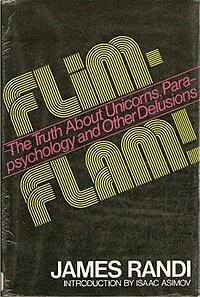Flim-Flam!

Cover of the 1982 edition
|
|
| Author | James Randi |
|---|---|
| Country | United States |
| Subject | Parapsychology and Occultism |
| Published |
|
| Pages |
|
| ISBN | (hardback) (paperback) |
| 133.8 19 | |
| LC Class | BF1042 .R24 1982 |
Flim-Flam! Psychics, ESP, Unicorns, and Other Delusions is a 1980 book by magician and skeptic James Randi about paranormal, occult, and pseudoscience claims. The foreword is by science fiction author Isaac Asimov.
Randi explores topics which he says that scientists and the media are too willing to promote without skepticism and proper expertise.
Timothy Ferris wrote that Flim Flam! "will enlighten any reader who does not clearly understand that not one shard of evidence exists to prove that the Bermuda Triangle poses any special menace to ships and planes, that earth is being visited by alien spacecraft, that the unassisted power of the mind can read closed books, predict our future or induce levitation, or that the 'psychic surgeons' of the Philippines have relieved their patients of any burden more troublesome than their money." Randi levels criticism at the sloppy study designs and faulty controls of the investigations into remote viewing by Russell Targ and Harold Puthoff.
George Kauffman wrote, "Randi explores and exposes the outrageous deceptions widely promoted in the sensation-seeking media." The book calls on "researchers" to be accountable for their failures and impostures. Randi writes the public is badly served by scientists investigating the paranormal who don't adhere to the standards of their profession and shows how sloppy research was followed with rationalization of their failures. The book repeatedly explores the sloppy nature of research into the paranormal, pointing out how commonly carelessness and selective interpretation that would not be tolerated in other fields of research is accepted in investigations of the supernatural. Randi documents how the scientific method is often twisted and bent to accommodate the subject of investigation.
...
Wikipedia
